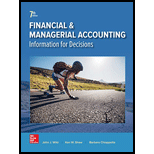
Relevant and Sunk Costs:
Relevant costs are those costs in any managerial decision-making process that will influence the flow of capital in the future. Hence, such costs decide whether the decision is taken forward or rejected.
On the other hand, sunk costs can be referred to as the outflows of cash which have already occurred, and no further decision can be taken to recover them. Such types of costs are required to be ignored while making decisions.
To identify: The correct statement from the given statements.
Answer to Problem 1MCQ
Solution:
Option a.
The company must correct the defect and sell them at the regular price is the correct statement.
Explanation of Solution
Option a.
The company has produced defective products, so the cost of production is a sunk cost and thus, no longer relevant. It is to be seen that maximum incremental revenue can be generated by the detective goods.
If the company corrects the anomaly and resells the product at its original price, the incremental revenue generated is calculated as shown below.
Hence, option a is correct.
Option b.
If the company decides to sell it to the recycler, the incremental revenue is as follows.
In this case, the incremental revenue is less than $33,000. Hence, option b is not correct.
Option c.
If the company decides to sell 2,000 units, incremental revenue is as follows.
The incremental revenue in this case is also less than $33,000. Hence, option b is not correct.
Option d.
If the firm decides to sell 1,000 units, the incremental revenue is as follows.
In this case, the incremental revenue is less than $33,000. Hence, option d is not correct.
Option e.
If the firm decides to throw the players away, no incremental revenue would be generated. Hence, option (e) is also not correct.
Hence, to maximize the incremental revenue, the firm must correct the anomaly and sell it in the market at the same price. Hence, the correct option is a.
Want to see more full solutions like this?
Chapter 23 Solutions
Financial and Managerial Accounting
- Peyton sells an office building and the associated land on May 1, please give answer this accounting questionarrow_forwardGiven answer accounting questionsarrow_forwardDuring its first month of operation, Peter's Auto Supply Corporation, which specializes the sale of auto equipment and supplies, completed the following transactions. July Transactions July 1 Issued Common Stock in exchange for $100,000 cash. July 1 Paid $4,000 rent for the months of July and August July 2 Paid the insurance company $2,400 for a one year insurance policy, beginning July 1. July 5 Purchased inventory on account for $35,000 (Assume that the perpetual inventory system is used.) July 6 Borrowed $36,500 from a local bank and signed a note. The interest rate is 10%, and principal and interest is due to be repaid in six months. July 8 Sold inventory on account for $17,000. The cost of the inventory is $7,000. July 15 Paid employees $6,000 salaries for the first half of the month. July 18 Sold inventory for $15,000 cash. The cost of the inventory was $6,000. July 20 Paid $15,000 to suppliers for the inventory purchased on January 5. July 26…arrow_forward

 AccountingAccountingISBN:9781337272094Author:WARREN, Carl S., Reeve, James M., Duchac, Jonathan E.Publisher:Cengage Learning,
AccountingAccountingISBN:9781337272094Author:WARREN, Carl S., Reeve, James M., Duchac, Jonathan E.Publisher:Cengage Learning, Accounting Information SystemsAccountingISBN:9781337619202Author:Hall, James A.Publisher:Cengage Learning,
Accounting Information SystemsAccountingISBN:9781337619202Author:Hall, James A.Publisher:Cengage Learning, Horngren's Cost Accounting: A Managerial Emphasis...AccountingISBN:9780134475585Author:Srikant M. Datar, Madhav V. RajanPublisher:PEARSON
Horngren's Cost Accounting: A Managerial Emphasis...AccountingISBN:9780134475585Author:Srikant M. Datar, Madhav V. RajanPublisher:PEARSON Intermediate AccountingAccountingISBN:9781259722660Author:J. David Spiceland, Mark W. Nelson, Wayne M ThomasPublisher:McGraw-Hill Education
Intermediate AccountingAccountingISBN:9781259722660Author:J. David Spiceland, Mark W. Nelson, Wayne M ThomasPublisher:McGraw-Hill Education Financial and Managerial AccountingAccountingISBN:9781259726705Author:John J Wild, Ken W. Shaw, Barbara Chiappetta Fundamental Accounting PrinciplesPublisher:McGraw-Hill Education
Financial and Managerial AccountingAccountingISBN:9781259726705Author:John J Wild, Ken W. Shaw, Barbara Chiappetta Fundamental Accounting PrinciplesPublisher:McGraw-Hill Education





